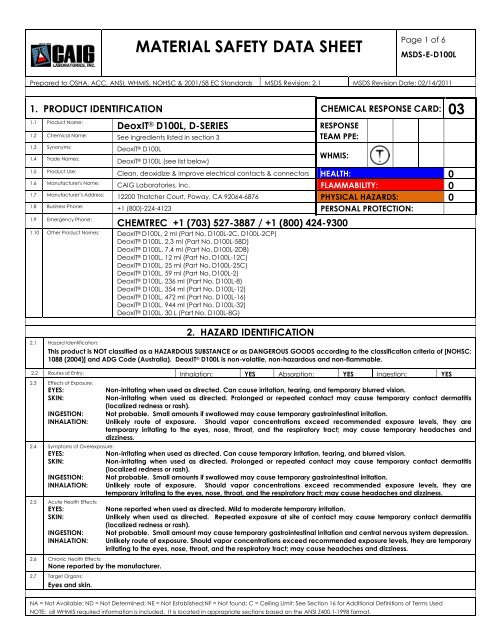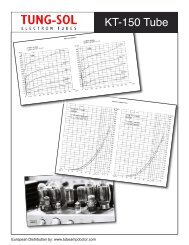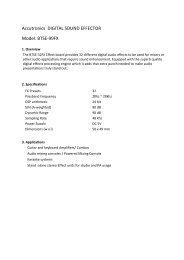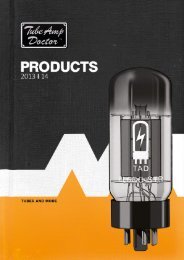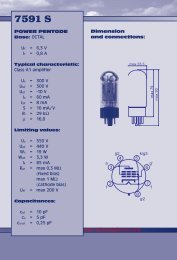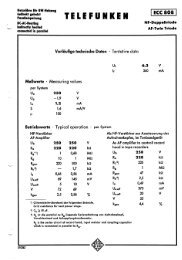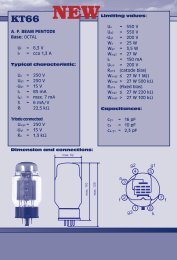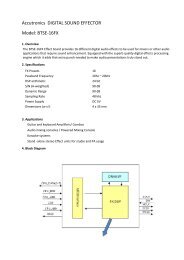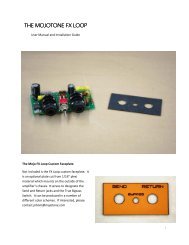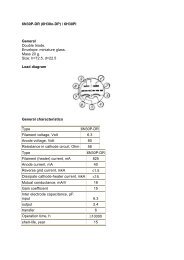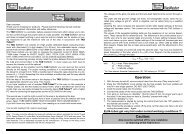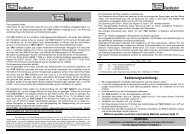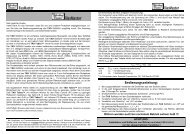Material Safety Data Sheet(MSDS)
Material Safety Data Sheet(MSDS)
Material Safety Data Sheet(MSDS)
You also want an ePaper? Increase the reach of your titles
YUMPU automatically turns print PDFs into web optimized ePapers that Google loves.
MATERIAL SAFETY DATA SHEET<br />
Page 1 of 6<br />
<strong>MSDS</strong>-E-D100L<br />
Prepared to OSHA, ACC, ANSI, WHMIS, NOHSC & 2001/58 EC Standards <strong>MSDS</strong> Revision: 2.1 <strong>MSDS</strong> Revision Date: 02/14/2011<br />
1. PRODUCT IDENTIFICATION CHEMICAL RESPONSE CARD: 03<br />
1.1 Product Name:<br />
DeoxIT ® D100L, D-SERIES<br />
1.2 Chemical Name:<br />
See ingredients listed in section 3<br />
1.3 Synonyms:<br />
DeoxIT ® D100L<br />
1.4 Trade Names:<br />
DeoxIT ® D100L (see list below)<br />
RESPONSE<br />
TEAM PPE:<br />
WHMIS:<br />
1.5 Product Use:<br />
Clean, deoxidize & improve electrical contacts & connectors HEALTH: 0<br />
1.6 Manufacturer's Name:<br />
CAIG Laboratories, Inc. FLAMMABILITY: 0<br />
1.7 Manufacturer’s Address:<br />
12200 Thatcher Court, Poway, CA 92064-6876 PHYSICAL HAZARDS: 0<br />
1.8 Business Phone:<br />
+1 (800)-224-4123 PERSONAL PROTECTION:<br />
1.9 Emergency Phone:<br />
CHEMTREC +1 (703) 527-3887 / +1 (800) 424-9300<br />
1.10 Other Product Names: DeoxIT ® D100L, 2 ml (Part No. D100L-2C, D100L-2CP)<br />
DeoxIT ® D100L, 2.3 ml (Part No. D100L-58D)<br />
DeoxIT ® D100L, 7.4 ml (Part No. D100L-2DB)<br />
DeoxIT ® D100L, 12 ml (Part No. D100L-12C)<br />
DeoxIT ® D100L, 25 ml (Part No. D100L-25C)<br />
DeoxIT ® D100L, 59 ml (Part No. D100L-2)<br />
DeoxIT ® D100L, 236 ml (Part No. D100L-8)<br />
DeoxIT ® D100L, 354 ml (Part No. D100L-12)<br />
DeoxIT ® D100L, 472 ml (Part No. D100L-16)<br />
DeoxIT ® D100L, 944 ml (Part No. D100L-32)<br />
DeoxIT ® D100L, 30 L (Part No. D100L-8G)<br />
2.1 Hazard Identification:<br />
2. HAZARD IDENTIFICATION<br />
This product is NOT classified as a HAZARDOUS SUBSTANCE or as DANGEROUS GOODS according to the classification criteria of [NOHSC:<br />
1088 (2004)] and ADG Code (Australia). DeoxIT ® D100L is non-volatile, non-hazardous and non-flammable.<br />
2.2 Routes of Entry: Inhalation: YES Absorption: YES Ingestion: YES<br />
2.3 Effects of Exposure:<br />
EYES:<br />
Non-irritating when used as directed. Can cause irritation, tearing, and temporary blurred vision.<br />
SKIN:<br />
Non-irritating when used as directed. Prolonged or repeated contact may cause temporary contact dermatitis<br />
(localized redness or rash).<br />
INGESTION: Not probable. Small amounts if swallowed may cause temporary gastrointestinal irritation.<br />
INHALATION: Unlikely route of exposure. Should vapor concentrations exceed recommended exposure levels, they are<br />
temporary irritating to the eyes, nose, throat, and the respiratory tract; may cause temporary headaches and<br />
dizziness.<br />
2.4 Symptoms of Overexposure:<br />
EYES:<br />
Non-irritating when used as directed. Can cause temporary irritation, tearing, and blurred vision.<br />
SKIN:<br />
Non-irritating when used as directed. Prolonged or repeated contact may cause temporary contact dermatitis<br />
(localized redness or rash).<br />
INGESTION: Not probable. Small amounts if swallowed may cause temporary gastrointestinal irritation.<br />
INHALATION: Unlikely route of exposure. Should vapor concentrations exceed recommended exposure levels, they are<br />
temporary irritating to the eyes, nose, throat, and the respiratory tract; may cause headaches and dizziness.<br />
2.5 Acute Health Effects:<br />
EYES:<br />
SKIN:<br />
INGESTION:<br />
INHALATION:<br />
2.6 Chronic Health Effects:<br />
None reported by the manufacturer.<br />
2.7 Target Organs:<br />
Eyes and skin.<br />
None reported when used as directed. Mild to moderate temporary irritation.<br />
Unlikely when used as directed. Repeated exposure at site of contact may cause temporary contact dermatitis<br />
(localized redness or rash).<br />
Not probable. Small amount may cause temporary gastrointestinal irritation and central nervous system depression.<br />
Unlikely route of exposure. Should vapor concentrations exceed recommended exposure levels, they are temporary<br />
irritating to the eyes, nose, throat, and the respiratory tract; may cause headaches and dizziness.<br />
NA = Not Available; ND = Not Determined; NE = Not Established;NF = Not found; C = Ceiling Limit; See Section 16 for Additional Definitions of Terms Used<br />
NOTE: all WHMIS required information is included. It is located in appropriate sections based on the ANSI Z400.1-1998 format.
MATERIAL SAFETY DATA SHEET<br />
Page 2 of 6<br />
<strong>MSDS</strong>-E-D100L<br />
Prepared to OSHA, ACC, ANSI, WHMIS, NOHSC & 2001/58 EC Standards <strong>MSDS</strong> Revision: 2.1 <strong>MSDS</strong> Revision Date: 02/14/2011<br />
3. COMPOSITION & INGREDIENT INFORMATION<br />
CHEMICAL NAME(S) CAS No. RTECS No. EINECS No. %<br />
TLV<br />
ppm<br />
EXPOSURE LIMITS IN AIR (mg/m 3 )<br />
ACGIH OSHA OTHER<br />
DeoxIT ® D100L Trade Secret NA NA 100 NE NE NE NE NE<br />
STEL<br />
ppm<br />
PEL<br />
ppm<br />
STEL<br />
ppm<br />
IDLH<br />
ppm<br />
4.1 First Aid:<br />
EYES:<br />
SKIN:<br />
INGESTION:<br />
INHALATION:<br />
4. FIRST AID MEASURES<br />
Flush eyes thoroughly with copious amounts of water for at least 15 minutes, holding eyelid(s) open to ensure<br />
complete flushing. If irritation persists, seek immediate medical attention.<br />
Remove contaminated clothing and wash affected areas with soap and water. If irritation persists, seek prompt<br />
medical attention. Do not wear contaminated clothing until after it has been properly cleaned.<br />
Do not induce vomiting! Drink plenty of water. If irritation persists, contact a physician.<br />
Remove victim to fresh air at once. If breathing is difficult, administer supplemental oxygen and seek immediate<br />
medical attention. If breathing stops, perform artificial respiration.<br />
4.2 Medical Conditions Aggravated by Exposure:<br />
None reported by the manufacturer.<br />
HEALTH 0<br />
FLAMMABILITY 0<br />
PHYSICAL HAZARDS 0<br />
PROTECTIVE EQUIPMENT A<br />
EYES<br />
5.1 Flashpoint & Method:<br />
> 250 °C (482 °F)<br />
5.2 Autoignition Temperature:<br />
NA<br />
5. FIREFIGHTING MEASURES<br />
5.3 Flammability Limits: Lower Explosive Limit (LEL): ND Upper Explosive Limit (UEL): ND<br />
5.4 Fire & Explosion Hazards:<br />
Carbon dioxide, carbon monoxide, hydrocarbons.<br />
5.5 Extinguishing Methods:<br />
CO2, Alcohol foam, Dry Chemical, Water Fog<br />
5.6 Firefighting Procedures:<br />
Wear NIOSH/MSHA approved self-contained breathing apparatus and protective clothing. Use a water<br />
spray to cool containers involved in fire. Do not use direct water stream. Container storage areas<br />
exposed to direct flame contact should be cooled with large quantities of water as needed to prevent<br />
weakening of container structure. Keep containers cool until well after the fire is out to prevent rupture.<br />
Prevent runoff from fire control or dilution from entering sewers, drains, drinking water supply, or any<br />
natural waterway.<br />
6.1 Spills:<br />
6. ACCIDENTAL RELEASE MEASURES<br />
Ventilate if in enclosed area. Secure spill area, remove or minimize all sources of ignition, and maximize ventilation. Wipe and rinse<br />
with water. Deny entry to all unprotected individuals. Individuals involved in the cleanup must wear appropriate personal protective<br />
equipment.
MATERIAL SAFETY DATA SHEET<br />
Page 3 of 6<br />
<strong>MSDS</strong>-E-D100L<br />
Prepared to OSHA, ACC, ANSI, WHMIS, NOHSC & 2001/58 EC Standards <strong>MSDS</strong> Revision: 2.1 <strong>MSDS</strong> Revision Date: 02/14/2011<br />
7. HANDLING & STORAGE INFORMATION<br />
7.1 Work & Hygiene Practices:<br />
Wash hands thoroughly after using this product and before eating, drinking, or smoking. Remove soiled clothing to prevent prolonged<br />
skin contact.<br />
7.2 Storage & Handling:<br />
Use and store in a cool, dry, well-ventilated area. Do not store near or with any incompatible materials listed in section 10. Open<br />
containers may change concentrations, keep tightly closed when not in use. Normal shelf life 2-3 years.<br />
7.3 Special Precautions:<br />
Empty containers may contain product residues.<br />
8.1 Ventilation & Engineering Controls:<br />
8. EXPOSURE CONTROLS & PERSONAL PROTECTION<br />
Use with adequate ventilation (e.g., open doors and windows, local exhaust ventilation).<br />
equipment is available (e.g., sink, safety shower, eye-wash station).<br />
8.2 Respiratory Protection:<br />
None required, when used with adequate ventilation.<br />
8.3 Eye Protection:<br />
Wear safety glasses with side shields (ANSI Z87) under normal use conditions.<br />
8.4 Hand Protection:<br />
Ensure appropriate decontamination<br />
None required under normal conditions of use. However, may cause skin irritation in some sensitive individuals. In such cases, wear<br />
rubber or impervious plastic gloves.<br />
8.5 Body Protection:<br />
Use as necessary to prevent skin contact.<br />
9.1 Density: 0.72<br />
9.2 Boiling Point: > 220 °C (428 °F)<br />
9.3 Melting Point: NA<br />
9.4 Evaporation Rate: NA<br />
9.5 Vapor Pressure: < 0.01 mm Hg @ 20 °C (68 °F)<br />
9.6 Molecular Weight: NA<br />
9.7 Appearance & Color: Light red<br />
9.8 Odor Threshold: Ethereal/hydrocarbon odor<br />
9.9 Solubility: Not soluble in water<br />
9.10 Ph NA<br />
9.11 Viscosity: 5.4 – 7.5 cSt @ 104 °F<br />
9.12 VOC (g/L): None<br />
9.13 Other Information: NA<br />
9. PHYSICAL & CHEMICAL PROPERTIES<br />
10. STABILITY & REACTIVITY<br />
10.1 Stability: Stable under normal conditions of use (see section 7).<br />
10.2 Hazardous Decomposition Products: Change in color signifies exposure to ultraviolet light or exceeding shelf life. Will not degrade to<br />
unstable products. Discard solution.<br />
10.3 Hazardous Polymerization: Will not occur.<br />
10.4 Conditions to Avoid: Use or storage near open flames, sparks, high heat (>100 °F) or other heat sources, and proximity to<br />
incompatible substances and heavily trafficked areas.<br />
10.5 Incompatible Substances: Strong oxidizers.
MATERIAL SAFETY DATA SHEET<br />
Page 4 of 6<br />
<strong>MSDS</strong>-E-D100L<br />
Prepared to OSHA, ACC, ANSI, WHMIS, NOHSC & 2001/58 EC Standards <strong>MSDS</strong> Revision: 2.1 <strong>MSDS</strong> Revision Date: 02/14/2011<br />
11. TOXICOLOGICAL INFORMATION<br />
11.1 Toxicity <strong>Data</strong>: This product has not been tested on animals to obtain toxicological data. There are toxicology data<br />
for the components of this product, which are found in the scientific literature. These data have not<br />
been presented in this document.<br />
11.2 Acute Toxicity: See section 3.5<br />
11.3 Chronic Toxicity: See section 3.6<br />
11.4 Suspected Carcinogen: NE<br />
11.5 Reproductive Toxicity: This product is not reported to produce reproductive toxicity in humans.<br />
Mutagenicity:<br />
This product is not reported to produce mutagenic effects in humans.<br />
Embryotoxicity:<br />
This product is not reported to produce embryotoxic effects in humans.<br />
Teratogenicity:<br />
This product is not reported to produce teratogenic effects in humans.<br />
Reproductive Toxicity:<br />
This product is not reported to produce reproductive effects in humans.<br />
11.6 Irritancy of Product: See Section 3.3<br />
11.7 Biological Exposure Indices: NE<br />
11.8 Physician Recommendations: Treat symptomatically.<br />
12. ECOLOGICAL INFORMATION<br />
12.1 Environmental Stability: This product will slowly volatile from soil. Components of this product will slowly decompose into<br />
organic compounds.<br />
12.2 Effects on Plants & Animals: There is no specific data available for this product.<br />
12.3 Effects on Aquatic Life: Releases of large volumes of this product are expected to be harmful or fatal to overexposed aquatic<br />
life.<br />
13. DISPOSAL CONSIDERATIONS<br />
13.1 Waste Disposal:<br />
Dispose of in accordance with federal, state or local regulations.<br />
13.2 Special Considerations:<br />
NA<br />
14. TRANSPORTATION INFORMATION<br />
The basic description (ID Number, proper shipping name, hazard class & division, packing group) is shown for each mode of transportation.<br />
Additional descriptive information may be required by 49 CFR, IATA/ICAO, IMDG and the CTDGR.<br />
14.1 49 CFR (GND):<br />
NOT REGULATED<br />
14.2 IATA (AIR):<br />
NOT REGULATED<br />
14.3 IMDG (OCN):<br />
NOT REGULATED<br />
14.4 TDGR (Canadian GND):<br />
NOT REGULATED<br />
14.5 ADR/RID (EU):<br />
NOT REGULATED<br />
14.6 SCT (MEXICO):<br />
NO REGULADO<br />
14.7 ADGR (AUS):<br />
NOT REGULATED
MATERIAL SAFETY DATA SHEET<br />
Page 5 of 6<br />
<strong>MSDS</strong>-E-D100L<br />
Prepared to OSHA, ACC, ANSI, WHMIS, NOHSC & 2001/58 EC Standards <strong>MSDS</strong> Revision: 2.1 <strong>MSDS</strong> Revision Date: 02/14/2011<br />
15.1 SARA Reporting Requirements:<br />
NA<br />
15.2 SARA Threshold Planning Quantity:<br />
NA<br />
15.3 TSCA Inventory Status:<br />
15. REGULATORY INFORMATION<br />
All chemical substances of this product are listed on the TSCA inventory or are otherwise exempt from inventory status.<br />
15.4 CERCLA Reportable Quantity (RQ):<br />
NA<br />
15.5 Other Federal Requirements:<br />
NA<br />
15.6 Other Canadian Regulations<br />
This product has been classified according to the hazard criteria of the Controlled Products Regulations<br />
(CPR) and the <strong>MSDS</strong> contains all of the information required by the CPR. The components of this product<br />
are listed on the DSL/NDSL. None of the components of this product are listed on the Priorities<br />
Substances List.<br />
15.7 State Regulatory Information:<br />
The primary component of this product is not listed on the following state lists: California OSHA; California Proposition 65;<br />
Massachusetts Right to Know List of Chemicals; New Jersey Right to Know List 8:59 Appendix A; Pennsylvania Hazardous Substances<br />
List 34 323 Appendix A; Wisconsin Hazardous Substances List NR 605.09; Minnesota Hazardous Substances List; and Florida Toxic<br />
Substances List.<br />
15.8 67/548/EEC (European Union) Requirements:<br />
The primary component of this product is not listed in Annex I of EU Directive 67/548/EEC.<br />
16.1 Other Information:<br />
NA<br />
16.2 Terms & Definitions:<br />
See page last page of this <strong>MSDS</strong>.<br />
16.3 Disclaimer:<br />
16. OTHER INFORMATION<br />
This <strong>Material</strong> <strong>Safety</strong> <strong>Data</strong> <strong>Sheet</strong> is offered pursuant to OSHA’s Hazard Communication Standard, 29 CFR §1910.1200. Other<br />
government regulations must be reviewed for applicability to this product. To the best of ShipMate's & CAIG Laboratories, Inc.’s<br />
knowledge, the information contained herein is reliable and accurate as of this date; however, accuracy, suitability or completeness<br />
are not guaranteed and no warranties of any type, either expressed or implied, are provided. The information contained herein<br />
relates only to the specific product(s). If this product(s) is combined with other materials, all component properties must be<br />
considered. <strong>Data</strong> may be changed from time to time. Be sure to consult the latest edition.<br />
16.4 Prepared for:<br />
CAIG Laboratories, Inc.<br />
12200 Thatcher Court<br />
Poway, CA 92064-6876<br />
+1 (800) CAIG-123 (244-4123) phone<br />
+1 (858) 486-8398 fax<br />
http://www.caig.com/<br />
16.5 Prepared by:<br />
ShipMate, Inc.<br />
P.O. Box 787<br />
Sisters, OR. 97759-0787<br />
+1 (310) 370-3600 phone<br />
+1 (310) 370-5700 fax<br />
http://www.shipmate.com/
MATERIAL SAFETY DATA SHEET<br />
Page 6 of 6<br />
<strong>MSDS</strong>-E-D100L<br />
Prepared to OSHA, ACC, ANSI, WHMIS, NOHSC & 2001/58 EC Standards <strong>MSDS</strong> Revision: 2.1 <strong>MSDS</strong> Revision Date: 02/14/2011<br />
DEFINITION OF TERMS<br />
A large number of abbreviations and acronyms appear on a <strong>MSDS</strong>. Some of these that are commonly used include the following:<br />
GENERAL INFORMATION:<br />
NATIONAL FIRE PROTECTION ASSOCIATION: NFPA<br />
CAS No.<br />
Chemical Abstract Service Number<br />
FLAMMABILITY LIMITS IN AIR:<br />
EXPOSURE LIMITS IN AIR:<br />
ACGIH American Conference on Governmental Industrial Hygienists<br />
TLV Threshold Limit Value<br />
OSHA U.S. Occupational <strong>Safety</strong> and Health Administration<br />
PEL Permissible Exposure Limit<br />
IDLH Immediately Dangerous to Life and Health<br />
FIRST AID MEASURES:<br />
Autoignition<br />
Temperature<br />
LEL<br />
UEL<br />
Minimum temperature required to initiate combustion<br />
in air with no other source of ignition<br />
Lower Explosive Limit - lowest percent of vapor in air, by<br />
volume, that will explode or ignite in the presence of<br />
an ignition source<br />
Upper Explosive Limit - highest percent of vapor in air,<br />
by volume, that will explode or ignite in the presence of<br />
an ignition source<br />
CPR<br />
Cardiopulmonary resuscitation - method in which a person<br />
whose heart has stopped receives manual chest<br />
compressions and breathing to circulate blood and provide<br />
oxygen to the body.<br />
HAZARDOUS MATERIALS IDENTIFICATION<br />
SYSTEM: HMIS<br />
HEALTH, FLAMMABILITY & REACTIVITY RATINGS:<br />
0 Minimal Hazard<br />
1 Slight Hazard<br />
2 Moderate Hazard<br />
3 Severe Hazard<br />
4 Extreme Hazard<br />
PERSONAL PROTECTION RATINGS:<br />
A<br />
B<br />
C<br />
D<br />
E<br />
F<br />
<strong>Safety</strong> Glasses<br />
Splash Goggles<br />
G<br />
H<br />
I<br />
J<br />
K<br />
X<br />
Consult your supervisor or S.O.P. for<br />
special handling directions.<br />
Face Shield &<br />
Eye Protection<br />
Gloves<br />
Boots Synthetic Apron Full Suit Dust Respirator<br />
Vapor Respirator<br />
Dust & Vapor<br />
Respirator<br />
Full Face<br />
Respirator<br />
HEALTH<br />
Airline Hood/Mask<br />
or SCBA<br />
Note: the dotted circle indicates that this respiratory protective<br />
equipment is required for high concentrations or for large<br />
volume spills or releases of product.<br />
HMIS®<br />
FLAMMABILITY<br />
REACTIVITY<br />
PERSONAL PROTECTION<br />
NCCHL44T © NPCA Printed by Labelmaster, A, American Labelmark Co., Chicago, IL 60646 (800) 621-5808<br />
HAZARD RATINGS:<br />
W<br />
0 Minimal Hazard<br />
1 Slight Hazard<br />
2 Moderate Hazard<br />
3 Severe Hazard<br />
4 Extreme Hazard<br />
ACD Acidic<br />
ALK Alkaline<br />
COR Corrosive<br />
Use No Water<br />
OX Oxidizer<br />
TOXICOLOGICAL INFORMATION:<br />
LD 50<br />
LC50<br />
ppm<br />
TD lo<br />
TCLo<br />
TD lo, LD lo, & LD o or<br />
TC, TC o, LC lo, & LC o<br />
IARC<br />
NTP<br />
RTECS<br />
BCF<br />
TL m<br />
log K OW or log K OC<br />
REGULATORY INFORMATION:<br />
WHMIS<br />
DOT<br />
TC<br />
EPA<br />
DSL<br />
NDSL<br />
PSL<br />
TSCA<br />
EU<br />
EC INFORMATION:<br />
FLAMMABILITY<br />
HEALTH<br />
REACTIVITY<br />
SPECIAL<br />
PRECAUTIONS<br />
Lethal Dose (solids & liquids) which kills 50% of the<br />
exposed animals s<br />
Lethal concentration (gases) which kills 50% of the<br />
exposed animal<br />
Concentration expressed in parts of material per<br />
million parts<br />
Lowest dose to cause a symptom<br />
Lowest concentration to cause a symptom<br />
Lowest dose (or concentration) to cause lethal or<br />
toxic effects<br />
International Agency for Research on Cancer<br />
National Toxicology Program<br />
Registry of Toxic Effects of Chemical Substances<br />
Bioconcentration Factor<br />
Median threshold limit<br />
Coefficient of Oil/Water Distribution<br />
Canadian Workplace Hazardous <strong>Material</strong> Information System<br />
U.S. Department of Transportation<br />
Transport Canada<br />
U.S. Environmental Protection Agency<br />
Canadian Domestic Substance List<br />
Canadian Non-Domestic Substance List<br />
Canadian Priority Substances List<br />
U.S. Toxic Substance Control Act<br />
European Union (European Union Directive 67/548/EEC)<br />
OTHER STANDARD ABBREVIATIONS:<br />
NA<br />
NR<br />
NE<br />
ND<br />
ML<br />
SCBA<br />
Not Available<br />
No Results<br />
Not Established<br />
Not Determined<br />
Maximum Limit<br />
Self-Contained Breathing Apparatus<br />
C E F N O T+ Xi Xn<br />
Corrosive Explosive Flammable Harmful Oxidizing Toxic Irritant Harmful


